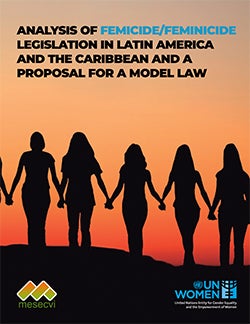
Analysis of Femicide Legislation in Latin America and the Caribbean

The Inter-American Convention on the Prevention, Punishment and Eradication of Violence against Women was adopted in Belém do Pará, Brazil by all the countries in Latin America and the Caribbean in 1994, formalizing the definition of violence against women as a violation of their human rights.
The Belém do Pará Convention establishes for the first time the development of mechanisms to protect and defend the rights of women, in the fight to eliminate violence against their physical, sexual and psychological integrity, both in the public and in the private spheres.
The Belém do Pará Convention asks the States Parties to adopt legislative measures of a criminal nature (among others) that “are necessary to prevent, punish and eradicate violence against women” (Article 7.c of the Convention) .
Recommendation No. 35 on gender based violence by the Committee for the Elimination of All Forms of Discrimination against Women (CEDAW) states that: “Women’s right to a life free from gender-based violence is indivisible from and interdependent with other human rights, including the right to life, health, liberty and security of the person, the right to equality and equal protection within the family, freedom from torture, cruel, inhumane or degrading treatment, freedom of expression, movement, participation, assembly and association.”
Feminists, surviving victims and academics in Latin America and the Caribbean managed to conceptualize as an offense of femicide/feminicide, developing a great regional debate, documenting and generating evidence in each country and comparing the phenomenon. It is from their great efforts that the typification of feminicide/femicide is achieved and it has been justified based on the standards of international human rights law.
In the framework of the CSW57 in 2013, in the agreed conclusions it was possible to incorporate the concept of femicide as a criminal offense expressing “concern for the violent murders of women and girls for reasons of gender, while recognizing the efforts made to face this form of violence in different regions, particularly in countries where the concept of femicide has been incorporated into national legislation.“
A first tool developed by the Office of the High Commissioner for Human Rights and UN Women in the Latin American and Caribbean region was the Latin American Model Protocol for the investigation of gender-related killings of women (femicide/feminicide) in the framework of the UN Secretary General’s Campaign UNITE to end violence against women.
On this occasion, both MESECVI and UN Women intend to provide the region with a model law on femicide/feminicide to address the most serious women´s human rights violation. To do so, we will first analyze the existing legislation, provoking debate and improvement in cases where it is required.